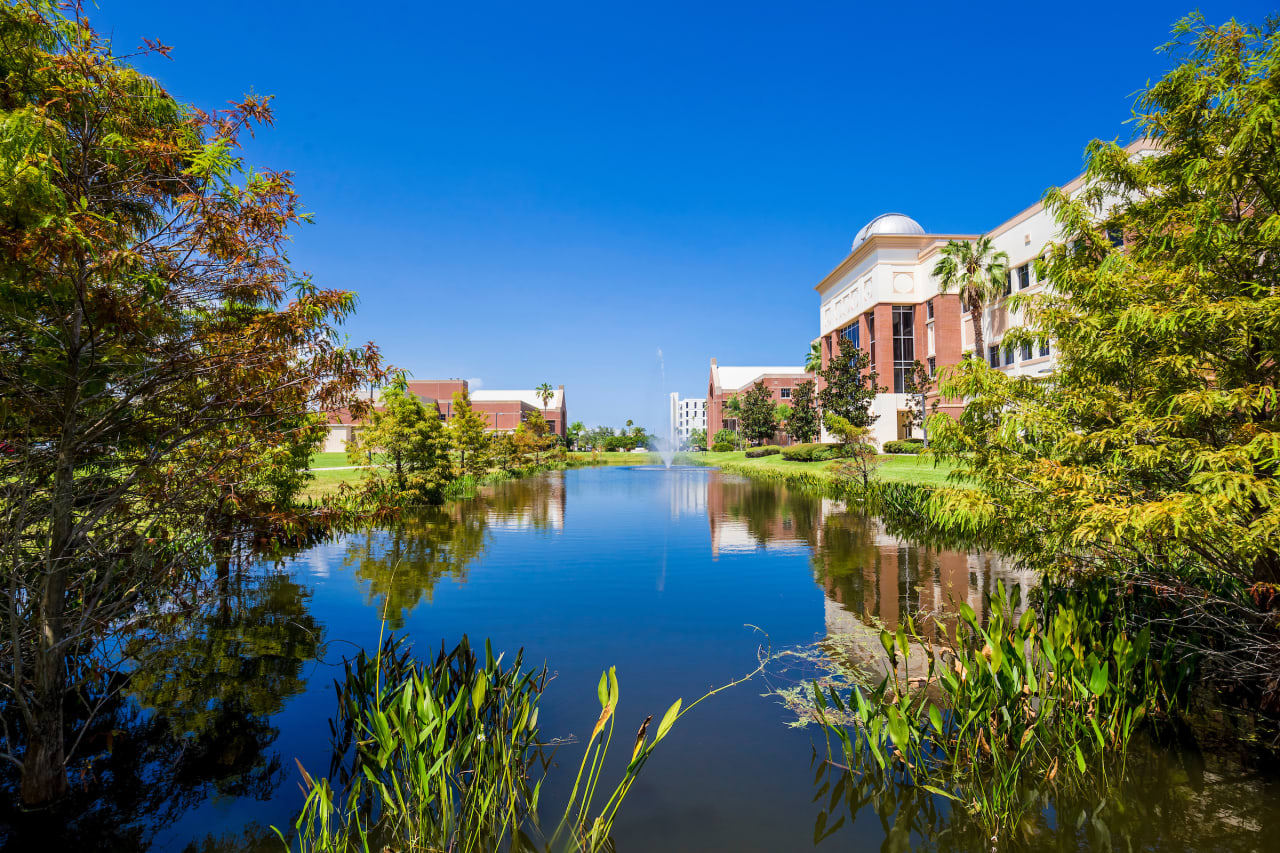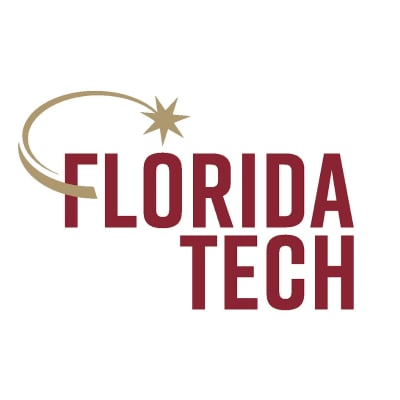
BS in Genomics And Molecular Genetics
Florida Institute of Technology

Key Information
Campus location
Melbourne, USA
Languages
English
Study format
On-Campus
Duration
4 years
Pace
Full time
Tuition fees
USD 21,173 / per semester
Application deadline
Request info
Earliest start date
Sep 2024
Introduction
What is a BS in Genomics and Molecular Genetics?
The field of genomics is transforming the field of biology and making an impact in the fields of oncology, pharmacology, and infectious disease. Together with molecular genetics (a branch of genetics that studies the structure and activity of genetic material at the molecular level), scientists are discovering the DNA blueprints of organisms and how their construction, regulation, and mutation contribute to human diseases.
Experts in the field of genomics and molecular genetics not only scrutinize the functioning and composition of a single gene but also understand the interrelationships of genes to identify their combined influence on the growth and development of the organism. Students in the genomics and molecular genetics degree program at Florida Tech explore this scientific relationship, developing the knowledge to solve real-world problems like antibiotic-resistant bacteria and curing cancer.
Professors immediately immerse students in the field, with access to modern genetic, genomic, cellular, and molecular approaches to the study of biology. The curriculum establishes a solid foundation in chemistry, biochemistry, physics, and mathematics, along with robust research projects.
The degree in genomics and molecular genetics program at Florida Tech concentrates on understanding the interactions between DNA, RNA, proteins in cells, and molecular genetics in an interdisciplinary field that reveals how life functions at both the molecular and organismal levels.
Gain Practical Experience
Led by faculty mentors committed to hands-on learning experiences, students in the genomics and molecular genetics degree program undertake exciting independent or collaborative (with a peer or professor) research. By working in research labs alongside faculty, graduate students, and fellow undergraduates, students build valuable skills and a highly competitive résumé.
The pinnacle of the genomics and molecular genetics major is the senior laboratory experience, during which students conduct an intensive study in genetic engineering and nucleic acid analysis.
Peerless Study and Internship Opportunities
Internships train students using the same equipment and techniques they will find on the job once they’ve completed their studies. Recent internship opportunities have included:
- Cold Spring Harbor Laboratory
- Fred Hutchinson Cancer Research Center
- Kennedy Space Center
- National Institutes of Health
- Intensive Senior Laboratory Research
Admissions
Curriculum
Participate in Cutting-Edge Faculty-Led Research
The Biology department has an active faculty who involve students directly in research and internships at the start of their freshman year. Florida Tech faculty quickly integrate students into their research groups, which in turn means students can identify their area of specialty early on in their college careers. Such research often results in scientific journal publications and research exchanges with other universities involved in genomics and molecular genetics.
Professors may also invite students to take part in faculty research teams. These projects allow students to participate in high-level research opportunities while still being undergraduates. As research assistants, students work on real-life problems like antibiotic-resistant bacteria, cures for cancer, crime-scene analysis, and agriculture in space.
The professors in the molecular biology department conduct diverse research projects including:
- Infrared imaging systems of pit vipers, pythons, and boas
- Toxicology of marine animals
- Molecular mechanisms underlying sperm-egg fusion
- Diseases such as Alzheimer’s cardiovascular and other diseases associated with cellular stress
- Plant communication
- Molecular targets for the development of novel antibiotics and pharmaceuticals
- Plant metabolomics
The curriculum culminates in a senior laboratory experience. This program consists of 15 to 20 hours a week of hands-on laboratory time, where students gain experience using the current tools and techniques used by molecular biology researchers.
Curriculum
The Bachelor of Science in Genomics and Molecular Genetics focuses on coursework and practical training to prepare students for graduate studies or entry-level positions in tomorrow’s biotechnology workforce. The program provides students with access to modern genetic, genomic, cellular, and molecular approaches to the study of biology. In addition to the relevant coursework in biology, the program features a solid foundation in chemistry, biochemistry, physics, and mathematics. Students are encouraged to seek out individual research experiences with departmental faculty for course credit. The final year focuses on an open-lab experience to empower students as independent thinkers with the technical and troubleshooting skills in demand in academic and government research labs, and pharmaceutical and biotechnology companies.
Research opportunities include antimicrobial development, the effects of climate change on the molecular biology of marine organisms, the molecular biology of fertilization, aging, marine toxicology, protein-folding disorders, chemical communication in bacterial populations, and other areas This degree is eligible for the fast track program, allowing students to complete a bachelor’s degree in biology and a master’s degree in biotechnology in five years.
Freshman Year
Fall (16 credit hours)
- BIO 1010 Biological Discovery 1
- BIO 1030 Introduction to Biotechnology
- CHM 1101 General Chemistry 1
- COM 1101 Composition and Rhetoric
- FYE 1000 University Experience
- MTH 1001 Calculus 1 orMTH 1010 Honors Calculus 1
Spring (15 credit hours)
- BIO 1020 Biological Discovery 2
- BIO 1040 Introduction to Biodiversity and Physiology
- CHM 1102 General Chemistry 2
- COM 1102 Writing About Literature
- MTH 1002 Calculus 2 or MTH 1020 Honors Calculus 2
Sophomore Year
Fall (17 credit hours)
- BIO 2110 General Genetics
- CHM 2001 Organic Chemistry 1
- CHM 2011 Organic Chemistry Laboratory 1
- PHY 1001 Physics 1
- PHY 2091 Physics Laboratory 1
Select the first HUM Core Course:
- HUM 2051 Civilization 1: Ancient Through Medieval
- HUM 2141 World Art History 1: Pre-History to Early Global Awareness
- HUM 2211 British Literature and Culture
- HUM 2212 British and American Literature 1
- HUM 2331 American History: Pre-Columbian to Civil War Era
- HUM 2551 Survey of Ancient and Medieval Philosophy
Spring (17 credit hours)
- CHM 2002 Organic Chemistry 2
- CHM 2012 Organic Chemistry Laboratory 2
- MAR 2801 Biometry
- PHY 2002 Physics 2
- PHY 2092 Physics Laboratory 2
Select the second HUM Core Course:
- HUM 2052 Civilization 2: Renaissance Through Modern
- HUM 2142 World Art History 2: Early Modern to Post-Colonial
- HUM 2212 British and American Literature 1 (may not be repeated for credit)
- HUM 2213 British and American Literature 2
- HUM 2332 American History: From Reconstruction to the Present
- HUM 2552 Survey of Modern and Contemporary Philosophy
Junior Year
Fall (16 credit hours)
- BIO 4010 Biochemistry 1
- BIO 4301 Cell Biology
- COM 2223 Scientific and Technical Communication or COM 2370 Speech
- Humanities Elective (HU) 3000-level or higher recommended Credit Hours: 3
- Restricted Elective (BIO, CHM, ENS, ISC, OCN, PSY) Credit Hours: 3
Spring (16 credit hours)
- BIO 4101 Molecular Biology
- BIO 4110 Biochemistry 2
- Free Elective Credit Hours: 3
- Social Science Elective Credit Hours: 3
- Technical Elective (AEE, AHF, AVS, BCM, BIO, BME, CHE, CHM, CIS, CON, CSE, CVE, ECE, ENS, ISC, MEE, MET, MTH, OCE, OCN, ORP, PHY, PSY, SPC, SPS, SWE, SYS) Credit Hours: 3
Senior Year
Fall (15 credit hours)
- BIO 4120 Genetic Engineering Techniques (Q)
- Liberal Arts Elective (LA) Credit Hours: 3
- Restricted Electives (BIO, CHM, ENS, ISC, OCN, PSY) Credit Hours: 8
Spring (17 credit hours)
- BIO 4102 Advanced Molecular Biology
- BIO 4130 Nucleic Acid Analysis (Q)
- Liberal Arts Elective Credit Hours: 3
- Restricted Elective (BIO, CHM, ENS, ISC, OCN, PSY) Credit Hours: 4
- Technical Elective (AEE, AHF, AVS, BCM, BIO, BME, CHE, CHM, CIS, CON, CSE, CVE, ECE, ENS, ISC, MEE, MET, MTH, OCE, OCN, ORP, PHY, PSY, SPC, SPS, SWE, SYS) Credit Hours: 3
Total Credits Required: 129
Career Opportunities
How Will a BS in Genomics and Molecular Genetics Prepare Me for the Future?
At Florida Tech, molecular genetics and genomics research is an integrated, high-tech, and thorough study program that prepares students for a research-based career in academia, pharmaceutical development, and biotechnology.
Career Outlook
Employers consistently recruit Florida Tech students for internships and employment. Graduates are well-prepared for entry-level positions as research scientists in a variety of industries including healthcare, pharmaceutical development, forensic science, biotechnology, genetics, food science, and bioengineering.
The Occupational Outlook Handbook, published by the US Department of Labor’s Bureau of Labor Standards (BLS), provides information about specific jobs including median annual pay, working conditions, and job outlook, among other things. According to the Bureau, employment in biology fields is expected to grow as much as 20% through 2018, while genetics and genomics career fields are expected to grow a whopping 29% through 2024.
English Language Requirements
Certify your English proficiency with the Duolingo English Test! The DET is a convenient, fast, and affordable online English test accepted by over 4,000 universities (like this one) around the world.